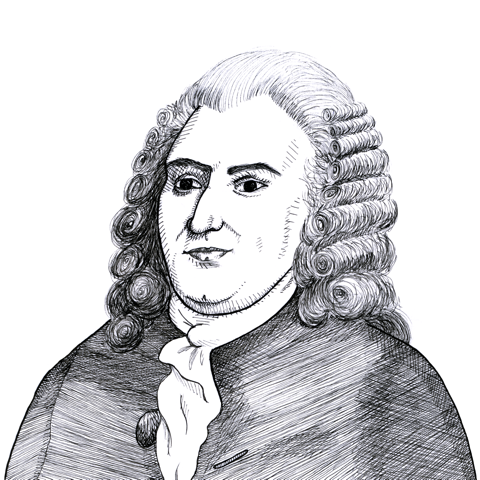Date of Birth: November 15, 1670
Zodiac Sign: Scorpio
Date of Death: January 21, 1733
Biography
Bernard de Mandeville was a Dutch-English philosopher, political economist, and satirist, best known for his work “The Fable of the Bees: or, Private Vices, Publick Benefits.” Born in Rotterdam, Netherlands, Mandeville was educated at the Erasmus School in Rotterdam and later at Leiden University, where he earned a medical degree in 1691. He moved to England in the late 17th century and began practicing medicine in London. Mandeville’s most notable contribution to philosophy and economics is his provocative assertion that individual vice could result in public economic benefits. This theme is most clearly articulated in “The Fable of the Bees,” first published in 1705. The book uses the metaphor of a bee hive to argue that the selfish actions of individuals can lead to positive outcomes for society as a whole, predating Adam Smith’s concept of the “invisible hand.” His satirical and often controversial views sparked significant debate and criticism among his contemporaries, influencing later economic and social theory. Mandeville’s work challenged prevailing moral and economic assumptions, making him a significant, though contentious, figure in the history of economic thought.
5 Interesting Facts about Bernard de Mandeville
1. Bernard de Mandeville was originally trained as a physician and practiced medicine in London.
2. His father was a prominent physician in Rotterdam, which influenced his decision to pursue a medical career.
3. “The Fable of the Bees” was initially published as a poem in 1705 and later expanded into a full book.
4. Mandeville’s ideas were highly controversial and led to debates with prominent figures of his time, including Bishop Berkeley and Francis Hutcheson.
5. His work laid the groundwork for the field of behavioral economics, emphasizing the unintended consequences of individual actions.
5 Most Interesting Quotes from Bernard de Mandeville
1. “Private vices, by the dexterous management of a skilful politician, may be turned into public benefits.”
2. “The root of evil, Avarice, that damned ill-natured baneful vice, was slave to prodigality, that noble sin.”
3. “If we inquire into the reason why the goods we consume daily are so cheap, we shall find that it is chiefly owing to the large quantities of them that are made and consumed.”
4. “The moral virtues are the political offspring which flattery begot upon pride.”
5. “Hunger is not only the most ancient and the most powerful of all causes of action; but it is the only one that acts always, and upon all occasions, uniformly and steadily.”
Highest Net Worth Achieved
There are no reliable records to estimate Bernard de Mandeville’s net worth. As a philosopher and physician in the 18th century, it is unlikely that he amassed significant wealth.
Children
There is no documented evidence that Bernard de Mandeville had any children.
Relevant Links
2. [Internet Encyclopedia of Philosophy – Bernard Mandeville](https://iep.utm.edu/mandevil/
3. [The Fable of the Bees – Full Text](https://www.gutenberg.org/ebooks/39713
4. [Biography on Britannica](https://www.britannica.com/biography/Bernard-de-Mandeville
5. [Overview on JSTOR](https://www.jstor.org/stable/10.5325/jhistreli.8.1.0065

